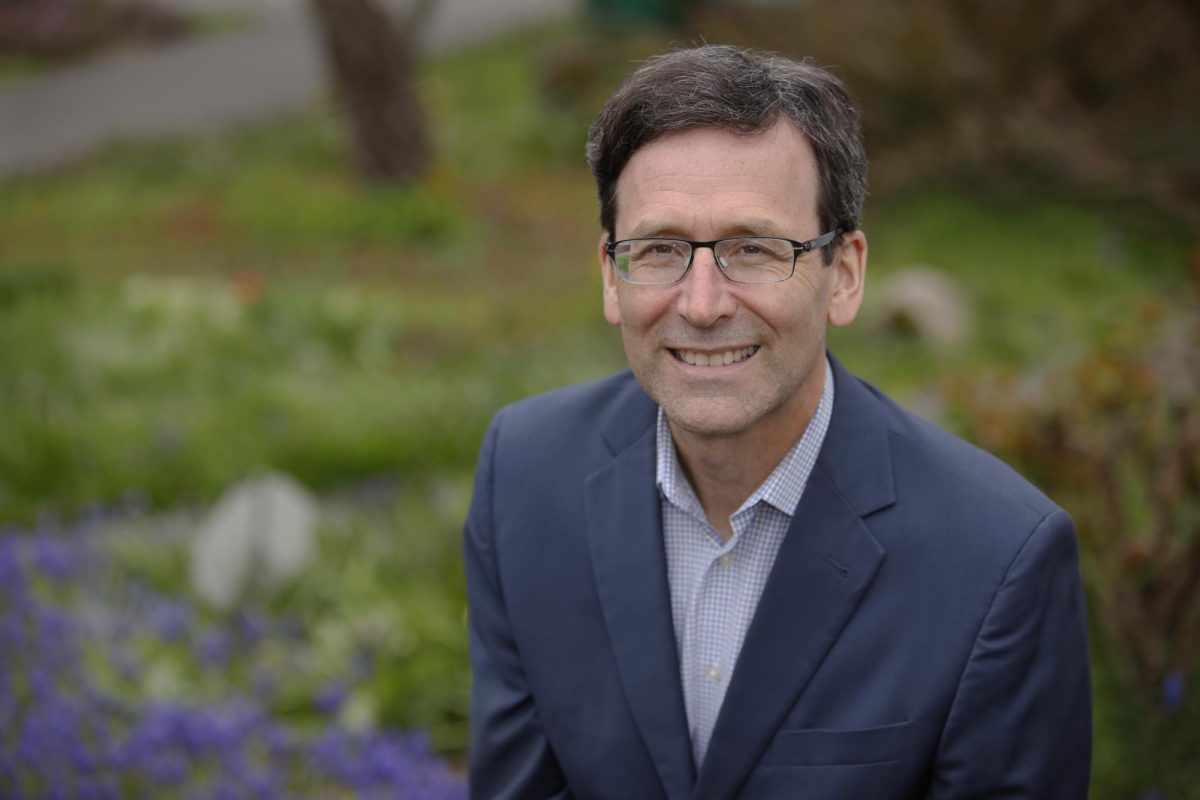As the federal government continues to gut funding to a variety of essential government services, such as the National Nuclear Security Administration and support for veterans, Americans wonder how these federal actions will affect them on a state level, and what can be done by their state governments to resist.
A panel held April 3 with Washington Governor Bob Ferguson examined such concerns. The event, titled “Rise of the Governors: Navigating Contrasts, Chaos and the Constitution,” featured questions from Journalist and Professional in Residence at Seattle University Joni Balter and Andres Recart Restovic, City of Seattle Mayor’s Fellow and candidate for a Master’s in Public Administration at Seattle U.
“I’ve interviewed ministers and high rank officials but never a governor. For me it was truly a once-in-a-lifetime experience and I was so grateful and honored to work with a journalist of Joni’s caliber,” Restovic said.
Restovic and Balter met over the course of several months leading up to the event to prepare informed and relevant questions for the governor.
“In sponsoring this series, Seattle University lives up to its ambition to be Seattle’s university, the living room where our city comes to think and deliberate about the most pressing issues of the day,” Seattle U President Eduardo Peñalver said, introducing the event.
This is not Ferguson’s first time in public office during a Trump presidency. He served as attorney general (AG) of Washington during Trump’s first term, where he sued the Trump administration 99 times, winning 56 of the cases. As governor, he now faces the unique challenges posed by Trump’s second term.
Fatema Boxwala, a former Seattle U student and coalition leader of Tech for Taxes, a group supporting progressive revenue bills in the state, attended the event. She wanted to ask the governor a question about her group’s legislative agenda, explaining that they have tried to contact the governor through other means and have not heard back.
She asked the governor if he would veto the Financial Intangibles Tax as part of the state budget.
“He said a lot of stuff about how the language of the tax as it’s written, he is concerned about the legality of it and its constitutionality, and he addressed a concern that if we pass it and it hits the courts and it’s deemed unconstitutional, where do we go from there,” Boxwala explained. “That actually doesn’t answer my question. My question was, would you veto it? And he didn’t answer that. This is the most information we’ve gotten about what his stance is on the bill, so I think it definitely provided insight we can use.”
Boxwala explained that her group and others have consulted lawyers and other experts throughout the legislative process. She appreciated the opportunity to clarify the governor’s stance on the issue. In his answer, Ferguson said he would be willing to work with the legislature on a version of the bill that he thinks would be constitutional. Boxwala believes this gives activists a statement to hold him accountable to.
The state budget is an issue of high concern, with federal budget cuts already impacting Washington.
“A big focus right now is that there are big budget implications coming from the federal government,” Ferguson said. “Just a few days ago, they announced they were withholding $160 million in funds for public health in Washington State. That’s a $160 million hole in our budget.”
Along with cuts from the federal government, Washington is facing a pre-existing $12-16 billion budget shortfall. Outside of cuts that have already occurred, Ferguson explained that about 28% of the Washington state budget comes from the federal government, and in the era of DOGE, the future of this money is uncertain.
Ferguson went on to explain that Trump’s recently imposed sweeping tariffs will impact Washington as a heavily trade-dependent state.
Trump recently postponed most of his reciprocal tariffs, but they are scheduled to go back into place after 90 days.
“We have to balance this budget in a way that involves some very, very difficult decisions so that we can meet the federal government when they try to hold us hostage with withholding of federal funds,” Ferguson said. “I do not want our state to be held financially hostage by Donald Trump and Elon Musk.”
Ferguson’s legal fight against Trump is ongoing, with his AG’s office already having filed multiple lawsuits against federal actions. He wants to support his AG’s office with the resources necessary to continue this effort. Ferguson actually began this effort about a year ago when he met with other Democratic AGs to begin preparing for the case of a second Trump term.
“There’s a reason why Washington state was the first state to take him on when he was first president, Muslim travel ban, and the first state to beat him,” Ferguson said. “It’s because the team was already working on a complaint before he took office because he talked about banning Muslims from the United States.”
He explained a similar preemptive complaint was prepared over Trump’s challenges to birthright citizenship. Ferguson has taken other measures, such as creating a rapid response team to help children left behind in cases of their parents being deported.
Restovic spoke to the importance of events like these for Seattle U.
“When we have such high-ranking officials visiting our school, telling us students how they feel about the world [and] about what they do. I think it’s important that all students and academia are exposed to that. I think it’s a win-win situation for us but also for them to express what they want to express,” Restovic said.
In politically uncertain times and increased power of the far right at the federal level, constituents of Democratic states turn to their governors to resist on a state level. This event gave students and the broader community an opportunity to hear from Washington’s governor in terms of his role in fighting for Washingtonians during the second term of Trump.







